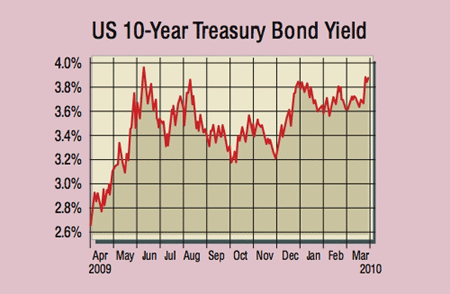
Are the markets losing patience with US government debt? Last week three US government bond auctions met with unexpectedly lacklustre demand. The yield on the ten-year Treasury jumped to a nine-month high of 3.9%.
In a further sign of market stress, the ten-year yield rose above the ten-year swap rate for the first time in living memory. The swap rate measures the cost of interbank borrowing. So this move implies the US government is a bigger credit risk than banks. The worry is that investors are now balking at the record debt sales needed to cover this year’s deficit of $1.4trn and imposing a sustained rise in yields (via falling bond prices). In short, they want higher interest rates to compensate for the huge supply increases. The trouble is Treasury yields are the benchmark for interest rates across the economy. Higher yields will mean higher mortgage, credit card and corporate borrowing costs. That’s a nasty cocktail that could choke off the anaemic recovery and hit equities.
But this could well be just a “short-term bout of jitters” that occasionally hits markets rather than the beginning of a “bloodbath” in US bonds, says Capital Economics. A disappointing German auction earlier this year raised similar concerns, but German yields have fallen back. A key trigger for last week’s panic was the passage of the $940bn healthcare bill. This must have reignited concern over the scale of spending, says Richard Barley in The Wall Street Journal. But the healthcare fuss is hardly news. Technical factors also explain the bond sell-off. Speculators betting on the yield gap between Treasuries and swaps were probably caught out by the sudden market move and were forced to sell Treasuries to close out positions.
Meanwhile, it’s hard to see bond markets turning their full attention to America, hitherto the world’s safe haven. After all, there are still “plenty more strains in the eurozone to go through”, says Steve Barrow of Standard Bank. “I will be astonished if countries such as the UK and US entirely avoid a government bond market shock; but I also suspect that this will occur some time down the road,” agrees Gillian Tett in the FT. Whatever happens, says Barley, the markets will be keeping an unusually close eye on next week’s US Treasury auctions.